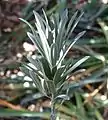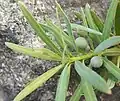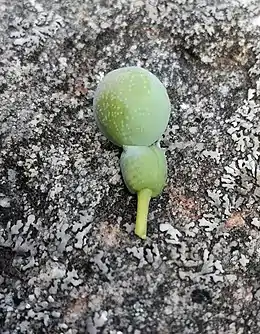Podocarpus elongatus
Podocarpus elongatus, the Breede River yellowwood, is a species of conifer in the family Podocarpaceae. In contrast to other yellowwood species of southern Africa, Podocarpus elongatus often resembles an enormous, round, multi-stemmed bush in its habit. The Breede River yellowwood is a protected tree in South Africa.[2]
| Breede River yellowwood | |
|---|---|
 | |
| Habit in the Pretoria National Botanical Garden | |
| Scientific classification | |
| Kingdom: | Plantae |
| Clade: | Tracheophytes |
| Clade: | Gymnosperms |
| Division: | Pinophyta |
| Class: | Pinopsida |
| Order: | Araucariales |
| Family: | Podocarpaceae |
| Genus: | Podocarpus |
| Species: | P. elongatus |
| Binomial name | |
| Podocarpus elongatus Aiton L'Herit. ex Pers. | |
Description
It can be distinguished from the other yellowwood species of Southern Africa by its relatively elongated, grey-blue leaves (hence its species name "elongatus"), and by its round, bushy shape. Note however, that Podocarpus henkelii was not described until after the name Podocarpus elongatus was established, and its leaves are decidedly longer, which might lead to some confusion. Podocarpus elongatus generally grows about as wide as it is tall, and its foliage reaches very low, roughly resembling a hut in habit.
Range and habit
It occurs only in South Africa, where it is restricted to the Breede River valley in the Western Cape and its range extends as far north as the Cedarberg mountains. It typically grows along rivers and on rocky outcrops in fynbos vegetation. This is the only South African yellowwood species that coppices when the trunk is damaged. It is a riverine species, and its ability to coppice is important to its survival in the event of its being levelled by floods or bushfires.
As a garden tree it is sometimes grown as an ornamental feature and its fruit attracts birds. Climatically it is hardier than other yellowwood species in surrounding regions.
Gallery
 foliage
foliage foliage close-up
foliage close-up foliage with fruit
foliage with fruit fruit with receptacle
fruit with receptacle
References
- Farjon, A.; Foden, W.; Potter, L. (2013). "Podocarpus elongatus". IUCN Red List of Threatened Species. 2013: e.T42501A2983276. doi:10.2305/IUCN.UK.2013-1.RLTS.T42501A2983276.en. Retrieved 16 November 2021.
- "Protected Trees" (PDF). Department of Water Affairs and Forestry, Republic of South Africa. Archived from the original (PDF) on 5 July 2010. Retrieved 13 June 2013.
